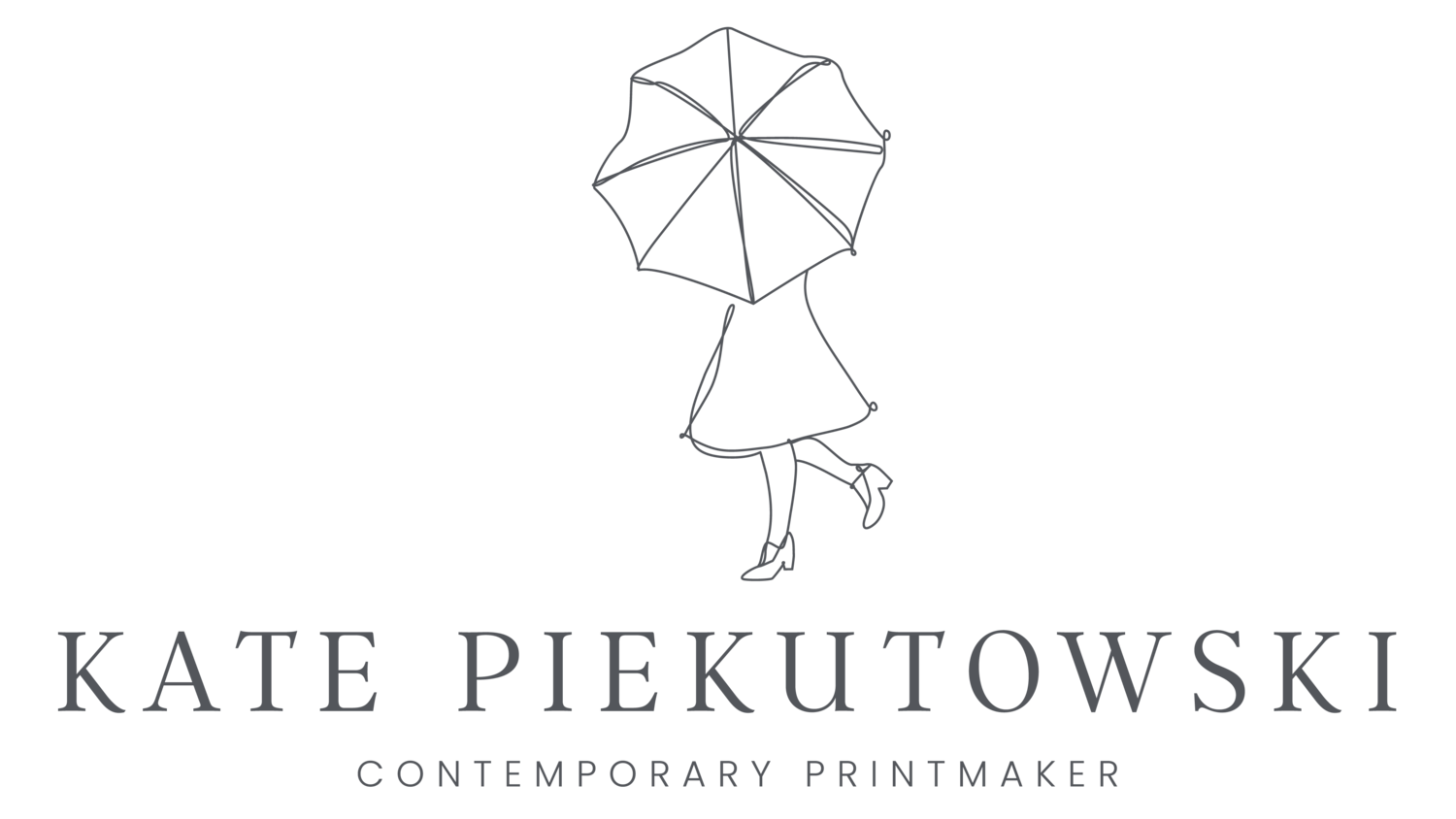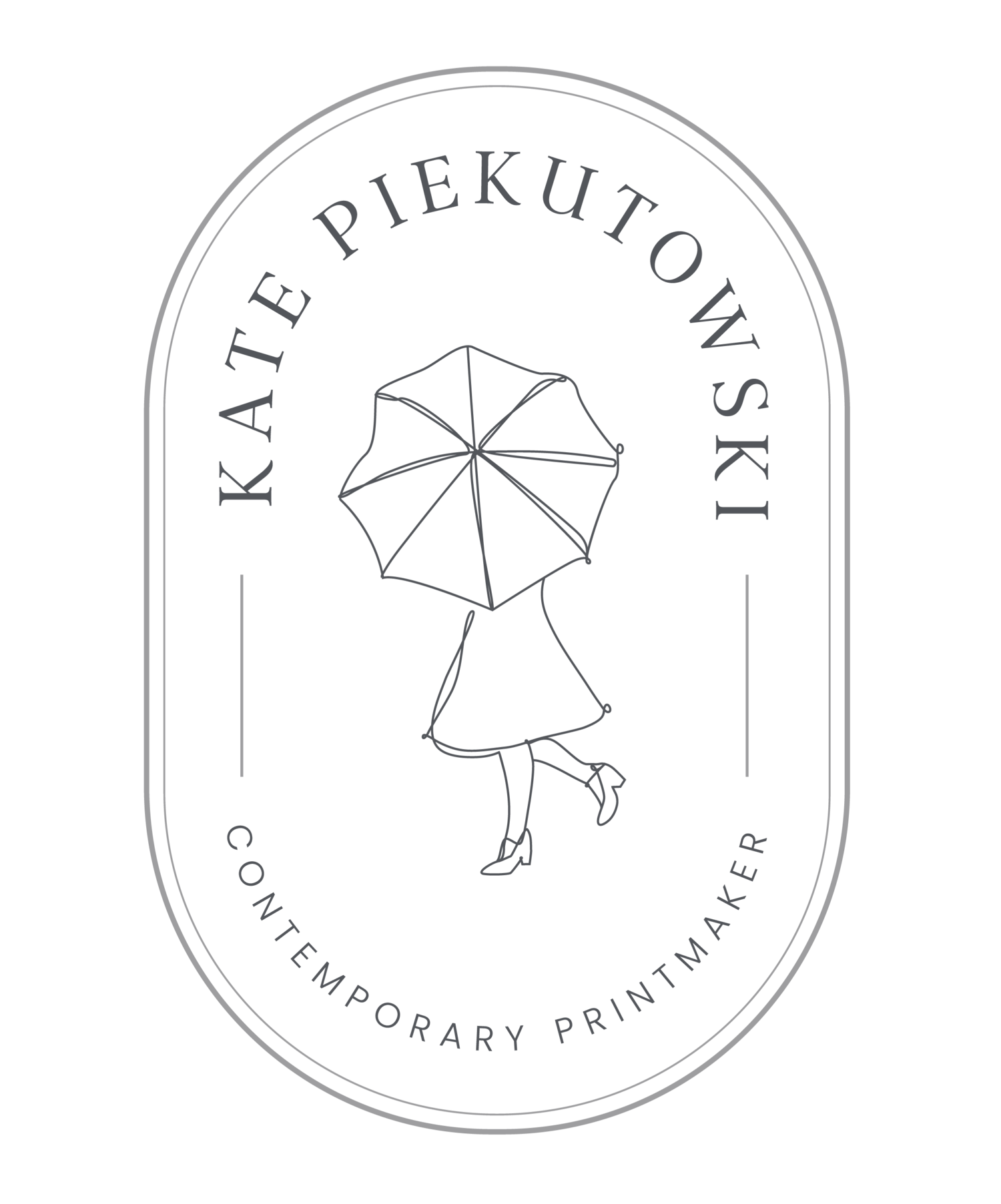 Image 1 of 4
Image 1 of 4

 Image 2 of 4
Image 2 of 4

 Image 3 of 4
Image 3 of 4

 Image 4 of 4
Image 4 of 4





SALE Etching 'The Gumnut Painter'
‘The Gumnut Painter’
By Kate Piekutowski
Etching, hand-painted
Unique State, 3/20 2020
Unframed Size: 15 x 20 cm
Studio sale etchings by Australian contemporary printmaker, Kate Piekutowski. Every year I like to declutter the studio and have a sale on some of my etchings. It is important for me to emphasise that all sale prints are slightly imperfect which is why they are heavily discounted. The colours may be lighter, darker or have some technical printing errors. Most of these are not hugely noticeable however they are to me as I am very picky and a bit of a perfectionist!
Etching Process
For those who don’t know, etching is a historic and traditional technique that uses a strong acid to cut into the unprotected parts of a metal surface. Evidence of the earliest engraved etchings are believed to date back to Germany, 1445. My etchings are made from either steel or copper and I use a bitumen hard ground to cover my plates which I then hand engrave. Each plate is then dipped into an acid bath and the acid bites away at my delicate lines. I then remove the hard ground layer and I am left with the engraving. Using a high-quality oil-based etching ink, I ink up my etching plate and use tarlatan (which is similar to a cheese cloth) to create soft, sweeping marks on my plate. The tarlatan creates plate tone and texture on my etchings. Once the plate is ready, I prepare my paper that has to be soaked in water beforehand. I dry the paper off and then put it through my etching press. Once printed, I let the layer dry.
After my etching has been printed, I often add an extra printed layer or add spray paint, acrylics, watercolours, gouache, gold leaf, black ink and gloss varnish. I call myself a contemporary printmaker as I have taken the traditional technique of etching and modernised it. I definitely break allot of printmaking rules in doing this, however I believe this process is what brings my artwork to life.
‘The Gumnut Painter’
By Kate Piekutowski
Etching, hand-painted
Unique State, 3/20 2020
Unframed Size: 15 x 20 cm
Studio sale etchings by Australian contemporary printmaker, Kate Piekutowski. Every year I like to declutter the studio and have a sale on some of my etchings. It is important for me to emphasise that all sale prints are slightly imperfect which is why they are heavily discounted. The colours may be lighter, darker or have some technical printing errors. Most of these are not hugely noticeable however they are to me as I am very picky and a bit of a perfectionist!
Etching Process
For those who don’t know, etching is a historic and traditional technique that uses a strong acid to cut into the unprotected parts of a metal surface. Evidence of the earliest engraved etchings are believed to date back to Germany, 1445. My etchings are made from either steel or copper and I use a bitumen hard ground to cover my plates which I then hand engrave. Each plate is then dipped into an acid bath and the acid bites away at my delicate lines. I then remove the hard ground layer and I am left with the engraving. Using a high-quality oil-based etching ink, I ink up my etching plate and use tarlatan (which is similar to a cheese cloth) to create soft, sweeping marks on my plate. The tarlatan creates plate tone and texture on my etchings. Once the plate is ready, I prepare my paper that has to be soaked in water beforehand. I dry the paper off and then put it through my etching press. Once printed, I let the layer dry.
After my etching has been printed, I often add an extra printed layer or add spray paint, acrylics, watercolours, gouache, gold leaf, black ink and gloss varnish. I call myself a contemporary printmaker as I have taken the traditional technique of etching and modernised it. I definitely break allot of printmaking rules in doing this, however I believe this process is what brings my artwork to life.
‘The Gumnut Painter’
By Kate Piekutowski
Etching, hand-painted
Unique State, 3/20 2020
Unframed Size: 15 x 20 cm
Studio sale etchings by Australian contemporary printmaker, Kate Piekutowski. Every year I like to declutter the studio and have a sale on some of my etchings. It is important for me to emphasise that all sale prints are slightly imperfect which is why they are heavily discounted. The colours may be lighter, darker or have some technical printing errors. Most of these are not hugely noticeable however they are to me as I am very picky and a bit of a perfectionist!
Etching Process
For those who don’t know, etching is a historic and traditional technique that uses a strong acid to cut into the unprotected parts of a metal surface. Evidence of the earliest engraved etchings are believed to date back to Germany, 1445. My etchings are made from either steel or copper and I use a bitumen hard ground to cover my plates which I then hand engrave. Each plate is then dipped into an acid bath and the acid bites away at my delicate lines. I then remove the hard ground layer and I am left with the engraving. Using a high-quality oil-based etching ink, I ink up my etching plate and use tarlatan (which is similar to a cheese cloth) to create soft, sweeping marks on my plate. The tarlatan creates plate tone and texture on my etchings. Once the plate is ready, I prepare my paper that has to be soaked in water beforehand. I dry the paper off and then put it through my etching press. Once printed, I let the layer dry.
After my etching has been printed, I often add an extra printed layer or add spray paint, acrylics, watercolours, gouache, gold leaf, black ink and gloss varnish. I call myself a contemporary printmaker as I have taken the traditional technique of etching and modernised it. I definitely break allot of printmaking rules in doing this, however I believe this process is what brings my artwork to life.













